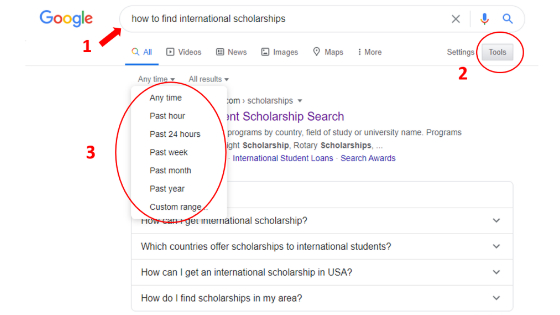How to find an international scholarship for 2023

Whether you want to start your university or college journey, or further your studies beyond undergraduate level with a higher degree, an international scholarship program might be just the thing you need to make your dream of international education become a reality. An estimated $7.4 Billion is awarded in scholarship funds each year. That might seem like a lot, but less than 10% of scholars are lucky enough to benefit from a scholarship opportunity. It can therefore get quite competitive which is why this article will show you how to find international scholarships the right way.
A scholarship is a financial aid gift that is awarded to someone for them to cover some of the costs of their education at university. There is no need to pay back the money the scholarship providers pay you.
Thanks to technology and the wonders of the internet, it is now easier than ever to find scholarship programs to study abroad. There are a lot of scholarship opportunities available online that you can take advantage of. You could be searching scholarship sites today and by next month you could be on a flight to Sydney, Sao Paulo or San Francisco.
Of course, it’s not an easy process, you have to put in the work. But if done right, you should have a fair chance of getting a college scholarship to put towards your tuition fees and education expenses.

1. Figure out what you want and plan for it first
Planning is the key if you want to do anything right. This is also true if you want to go abroad and study. This is therefore the first step you should take on your scholarship search.
One thing you will notice immediately when you start your search for scholarships is that they each come with different conditions. While some are micro – scholarships of just a few hundred dollars, others will pay for a full semester abroad, or you may even find full ride scholarships that essentially cover all of your expenses. Some look at your academic achievements, while others require you to have something special besides your grades.
You should write a list of what you are looking for exactly. This is in terms of location or locations you’d like to study, majors or specific fields of study you are interested in, financial flexibility, culture diversity, and so on. This will make it easier for you to spot the most suitable offers, prioritize the most ideal options and allocate your time and efforts accordingly.
You’d be surprised how many people miss great opportunities due to being disorganized.
2. Do your research
Few opportunities come to you without you chasing them down in life. If you want to find the right academic scholarship, you should be ready to dig. There are more than 25,000 universities in the world and around 1.7 Million private scholarships that are awarded each year. Your job is to find the right scholarships and the institutions they can get you into.
You can break this process into three sections; browser searching, social media searching, and direct inquiry. Google is very broad, so the best way to do your search is to start broad and narrow down to where what you’re looking for.
Broad searches
You can start with a simple “How to find international scholarships,” like you probably did to get to this article. Bookmark or save the offers that look interesting and actionable.
From here you want to start searching for opportunities that are related to your interests like:
- Scholarships for studying in USA OR,
- Scholarships for medicine students.
You also have to save any interesting offers along with their requirements.
Specific searching
A detailed search is likely to give you the least options, but it will have the most relevant results. To get the best offers, you have to try thinking outside the box. For instance, Instead of just taking all results, use google and social media platform filters to refine your search. You can start by going to the scholarship search tool at internationalscholarships.com for a start. They have helped thousands of students around the world so far.
You can also take a shortcut by filtering your results. For instance, you can filter your results by date to find the most recent offers, considering that you will find the most recent scholarships for international students that haven’t yet been found by other applicants.

Direct inquiry
You can also get the answers you are looking for directly from the source. Through your research, you should be able to find a lot of contacts and connections. This allows you to directly call the institutions you find, contact the scholarship funders or education counselors, and build relationships with other people who managed to study abroad through scholarships.
After all this, along with asking and searching the right queries, you should have a clear picture of what’s available, what the requirements are, and how it aligns with what you want personally.
3. Apply as if your life depends on it
At this stage, you start writing your scholarship applications. This will probably take the most effort and time to do. This is where you’ll be writing, searching for documents, drafting and redrafting scholarship essays, and getting sleepless nights.
As mentioned above, there are different types of scholarships for international students. Knowing each type will increase your chances of writing an application that convinces whoever is reading it. It’s easy for the administrators to tell when an applicant has done their research and when they haven’t. So make sure you write a separate application that is specific to each program.
Here is a brief breakdown of the main types of scholarship available each year:
- Academic and merit-based scholarships
Based on your GPA (Grade Point Average) or other test scores such as the SAT, ACT or similar which you may have to take to qualify. The requirements will vary depending on the provider.
- Special Interest or Field-of-Study Awards
Based upon your chosen academic subject or sometimes a particular area of interest such as Arts or Drama
- Need-Based Scholarships
These are awarded to students in the most financial need of assistance.
You have to do your research on these as you can find grants and awards from institutions that are looking for someone like you already. Submit your applications in time and be sure to follow the application process to the letter. In-fact, just try to do everything way ahead of time so you don’t have to rush at the last minute.
4. Stay alert for responses
My athletics teacher always said, “Even if you’re far ahead of the others, you’re not a winner before you cross the line.”
Online meetings and communication
These days a lot of universities, colleges and sponsors like to see you or at least talk to you before they decide if you’re the right person and that you meet the eligibility requirements. Thousands of people might apply for the same funding as you, so award administrators are right to do their due diligence and make sure before a decision is made.
Sometimes they do background checks on social media. This means that you have to make sure all of your online profiles communicate the message in your application. You don’t have to start making big changes on your profile, but your application should not have information that can be easily contradicted.
Quick responses
Always be on the lookout for replies that come in. This will help you to respond quickly. The last thing you want is to lose your chance because you responded too late. As they say – the early bird catches the worm.
5. Choosing an offer
If you get an offer – congratulations! If you get more than one offer and have to decide between them you’ve done a fantastic job of all the steps above!
When choosing between options, you have to go back to the beginning and think about why you applied in the first place. Is there an offer that already aligns with what you were looking for?
For example, was there a specific international university you wanted to attend, or a particular experience you wanted to have? Maybe you had a specific goal or destination in mind.
You need to do your research here as well. Talk to admission counselors, ask questions of your peers, find related institutes, contact the embassy for the country you want to go to, and get a full picture of all your offers.
Once you have made a choice, don’t just ignore any other offers. Contact them to let them know that you are grateful and inform them that you have made other plans. After all, they were willing to help you.
Good Luck!
The last piece of advice that I’ll give you is that going to a different environment and experiencing new things is amazing. Just make sure you don’t get too carried away and forget about your main priorities. Have a healthy balance between everything that you do.
With all this, I’m sure you now have a clear picture of how to find international scholarships.
All the best in your pursuit.






I am eagerly looking for scholarship but the process is not clear.
Hi there!
To start your search, please visit our website. There, you can view scholarships that you might be eligible for by browsing our awards or using our quick search tool, which will narrow down the scholarships based on what you are studying, where you are studying, or where you are from. https://www.iefa.org/scholarships
Once you find a scholarship you are eligible for or interested in, you must contact the institution responsible for the scholarship directly. They can assist you with the application process and any questions.
thank you for the hint that how can I search international scholarships
I am from Ethiopia looking free scholarship university
Hi,
Thank you for your comment!
We recommend exploring various scholarship and financial aid options that might be available to you. Our scholarship search tool can be a great resource. You can access it here: https://www.iefa.org/scholarships.
Additionally, for more comprehensive information on financial aid options, including loans and other forms of assistance, please visit our resources page here: https://www.iefa.org/international-student-loans
Remember, each scholarship or financial aid program will have its own application process and requirements, so be sure to contact the relevant organizations directly for guidance.
Best of luck with your studies, and keep pursuing your dreams!
– The IEFA Team
I am interested in the scholarship program pls.
Hi,
Thank you for your comment!
We recommend exploring various scholarship and financial aid options that might be available to you. Our scholarship search tool can be a great resource. You can access it here: https://www.iefa.org/scholarships.
Additionally, for more comprehensive information on financial aid options, including loans and other forms of assistance, please visit our resources page here: https://www.iefa.org/international-student-loans
Remember, each scholarship or financial aid program will have its own application process and requirements, so be sure to contact the relevant organizations directly for guidance.
Best of luck with your studies, and keep pursuing your dreams!
– The IEFA Team
Nobember29,at3:04pm I am interested in the scholarship program pls.
Hi,
Thank you for your comment!
We recommend exploring various scholarship and financial aid options that might be available to you. Our scholarship search tool can be a great resource. You can access it here: https://www.iefa.org/scholarships.
Additionally, for more comprehensive information on financial aid options, including loans and other forms of assistance, please visit our resources page here: https://www.iefa.org/international-student-loans
Remember, each scholarship or financial aid program will have its own application process and requirements, so be sure to contact the relevant organizations directly for guidance.
Best of luck with your studies, and keep pursuing your dreams!
– The IEFA Team